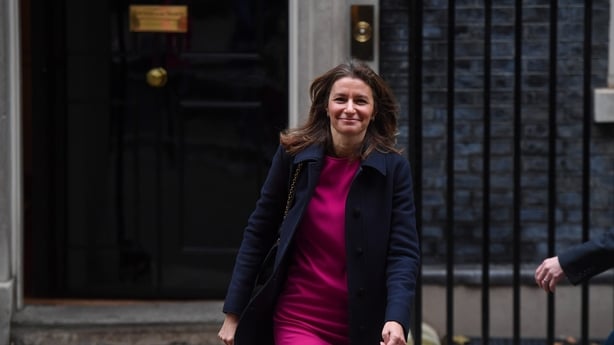The UK's TV licence fee will rise by £10.50 (€12.20) to £169.50 (€197.60) a year after a two-year freeze, Culture Secretary Lucy Frazer has confirmed.
The household payment, which funds much of the BBC's operations, had been frozen at £159 and was set to rise in line with inflation next year.
The UK government froze the fee for two years in January 2022, but the expected 9% increase - which would have meant an increase of around £15 (€17.50) from April 2024 - has been reduced, the UK government said.
Speaking in Parliament, Lucy Frazer said the increase will instead be based on September's consumer prices index rate of inflation which was 6.7%. This will mean an increase of £10.50 (€12.20) to £169.50 (€197.60) per year.
She also announced a review into the licence fee model, which will look at alternative funding and report next autumn.
Ms Frazer said: "The review will look at how we can ensure the funding model is fair to the public, sustainable for the long term and supports the BBC's vital role in growing our creative industries."
The news comes after the veteran TV executive Dr Samir Shah was named yesterday as the UK government's preferred candidate to become BBC chairman.
The BBC board said in a statement: "We note that the government has restored a link to inflation on the licence fee after two years of no increases during a time of high inflation.

"The BBC is focussed on providing great value, as well as programmes and services that audiences love. However, this outcome will still require further changes on top of the major savings that we are already delivering.
"Our content budgets are now impacted, which in turn will have a significant impact on the wider creative sector across the UK.
"We will confirm the consequences of this as we work through our budgets in the coming months."
The fee funds BBC television, radio and online services as well as programming, many of which are exported commercially worldwide.
Supporters maintain it provides excellent value for money, and a range of services from news and current affairs to wildlife documentaries, children's output, drama and music.
But critics, including rival commercial broadcasters, have long complained that its guaranteed funding model, which criminalises non-payers, is unfair.
The announcements come as the BBC faces increased funding pressure.
The corporation is currently looking to make £500 million (€582m) in savings and recently announced cutbacks to its flagship 'Newsnight' political programme.
It warned that the fear increase "will still require further changes on top of the major savings that we are already delivering".
Additional reporting by AFP

